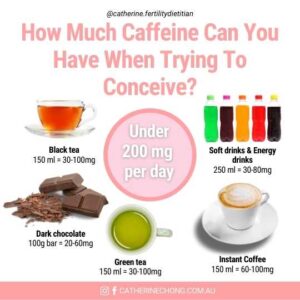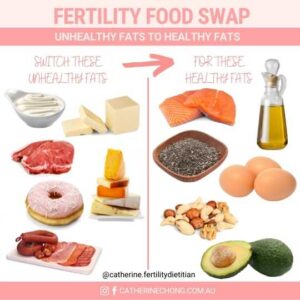Seven Less Fertile Foods To Avoid
A healthy eating pattern and lifestyle rich in fertility enhancing foods, such as fruits, vegetables, whole grains, fish and seafood, can help increase fertility and provide health benefits for a mother and their growing baby. However, some foods can reduce your chances of conceiving.
This blog post shows you which foods are worth steering clear of to increase your fertility. Here are the seven foods you should avoid while trying to get pregnant, as they can make you less fertile:
1. Avoid Sugar-Sweetened Beverages to Boost Fertility
A study by Hatch et al. (2018) explored the effects of sugar-sweetened beverages (SSBs) on the ability to conceive. The researchers followed 3,828 women and 1,045 of their male partners in North America who were trying to get pregnant. They discovered that consuming a lot of SSBs, such as sodas and energy drinks, significantly reduced the chances of conception for both women and men.
Women who drank seven or more SSBs per week had a 19% lower chance of getting pregnant, while men had a 22% lower chance compared to those who didn’t consume these beverages. The study suggests that cutting down on sugary drinks could help improve fertility for couples trying to conceive.
2. How Caffeinated Beverages Impact Your Fertility
Recent meta-analyses have unearthed significant correlations between caffeine and coffee intake and adverse pregnancy outcomes.
One such analysis reviewed 26 studies and discovered that caffeine and coffee consumption heightened the risk of pregnancy loss. The risk increased by 19% with every additional 150 mg/day of caffeine—approximately the amount in one espresso coffee.
Another meta-analysis of 60 studies confirmed that greater caffeine intake during pregnancy might increase the risk of spontaneous abortion, stillbirth, low birth weight, and small for gestational age (SGA) infants.
Specifically, an additional 100g of caffeine intake was associated with a 14% increase in spontaneous abortion, a 19% increase in stillbirth, a 7% increase in low birth weight, and a 10% increase in SGA.

While the debate around avoiding caffeine is ongoing, Australian guidelines suggest that pregnant women and those trying to conceive should limit their caffeine intake to no more than 200mg daily, equivalent to approximately two cups of coffee.
If you want to learn more about the impact of decaffeinated coffee, read our previous blog post here.
3. Avoid Beverages Containing Artificial Sweeteners
A study involving 524 patients undergoing intracytoplasmic sperm injection (ICSI) found that consuming soft drinks, both regular and diet, as well as coffee with artificial sweeteners, negatively impacted oocyte and embryo quality.
Diet soft drinks were particularly detrimental, lowering embryo quality and tending to decrease implantation rates and pregnancy chances.
Unsweetened coffee showed no adverse effects, but adding sugar to coffee did reduce oocyte quality. These results suggest that artificial sweeteners in beverages can harm fertility and reduce the success rates of assisted reproduction treatments.
4. Why Avoid Alcohol For Enhancing Fertility
An article examines the impact of alcohol consumption on reproductive health. It highlights that excessive alcohol intake can lead to multiple reproductive risks, such as impaired ovarian reserve, altered menstrual cycles, and decreased fertility treatment success in women. Chronic alcohol use can also reduce ovarian reserve and lead to earlier menopause.
Another study conducted by Jensen et al. (2014) involving 1,221 young Danish men found that chronic alcohol consumption is associated with reduced semen quality and changes in reproductive hormones.
The research showed that higher habitual alcohol intake, notably more than 25 units per week, was linked to lower sperm concentration, total sperm count, and percentage of normal sperm. Men consuming over 40 units weekly had a 33% reduction in sperm concentration compared to those consuming 1-5 units.
If you’re trying to get pregnant, it’s best to limit or avoid alcohol altogether.
5. Avoid Saturated and Trans Fats And Swap with Fertility Enhancing Foods
Saturated and trans fats have been associated with adverse reproductive outcomes in both males and females. In females, these fats can disrupt hormonal balance and ovarian function, while in males, they impair semen quality and hormone levels.
Reducing the intake of these fats and opting for healthier fats, such as polyunsaturated and monounsaturated fats, can potentially improve reproductive health outcomes.

Foods High In Trans Fats:
- Highly processed takeaway foods, e.g. hamburgers and pizza
- Deep-fried foods
- Cakes, biscuits and pastries
- Butter
- Any food that lists hydrogenated oils or partially hydrogenated vegetable oils as an ingredient
Foods High In Saturated Fats:
- Coconut and palm oil
- Butter
- Lard
- Ghee
- Red and processed meat
- Cream
- Ice cream
- Cakes, biscuits, pies and pastries
If you want to learn more about including more fertility enhancing foods in your diet, read our previous blog post here.
6. Avoid Red and Processed Meats
High consumption of red and processed meats has been linked to reduced fertility in both men and women. A study found that men who consumed large amounts of processed meat had lower sperm counts and poorer sperm morphology. At the same time, fish intake positively impacted sperm counts and morphology in men attending a fertility clinic.
Additionally, for women trying to conceive, increased consumption of whole grains, omega-3 fatty acids, fish, and soy, as well as reduced consumption of trans fats and red meat, may improve female fertility.
7. Lifestyle Factors and Their Impact on Fertility
Modifiable lifestyle factors apart from diet play a significant role in reproductive health. Habits such as smoking, drug use, stress, and obesity can negatively impact both male and female fertility. Addressing these factors can enhance the chances of conception. For instance, reducing stress through mindfulness practices, maintaining a healthy weight through diet and exercise, and avoiding smoking and excessive alcohol can improve fertility outcomes.
Bottom Line
- Focus on Fertility Enhancing Foods. Prioritise fruits, vegetables, whole grains, fish, and seafood to boost fertility and support reproductive health.
- Minimise your intake of saturated fats, trans fats, sugar-sweetened beverages, and artificial sweeteners.
- By quitting smoking, limiting alcohol intake, reducing stress, and maintaining a healthy weight, you are taking a determined step towards improving your fertility outcomes.
